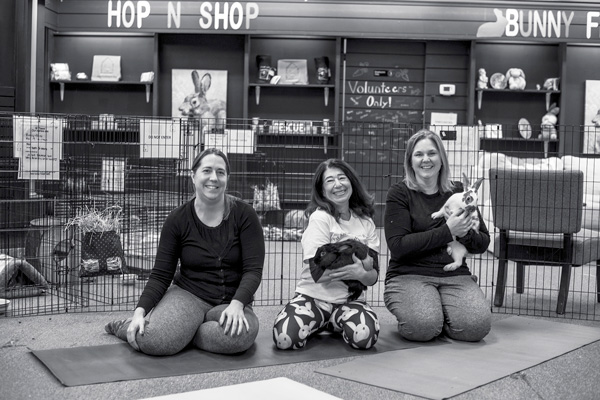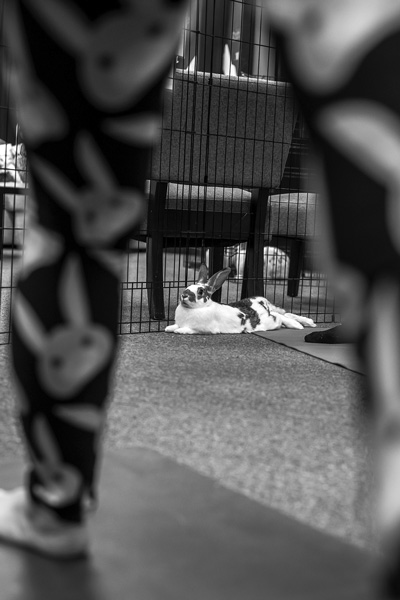News & Issues February-March 2022
Big hearts for big ears
Pet rabbits find sanctuary at new Saratoga-area shelter

Rabbit “foster mom” Brandy Caro, yoga instructor Jamie Lemnotis and yoga student Stephanie Lyons enjoy a moment with the rabbits after a Bunny Yoga class at Hop on Home, a rabbit rescue and adoption organization, at its space at Wilton Mall in Saratoga County. Joan K. Lentini photo
By STACEY MORRIS
Contributing writer
WILTON, N.Y.
Shelby Wimet-Himelrick doesn’t just love rabbits. She advocates for them.
At first that may sound strange. But when she recounts her evolution from being a 4-H Club leader to founding a rabbit sanctuary, it makes perfect sense.
Several years ago, after Wimet-Himelrick started running a domestic rabbit club at the Saratoga County 4-H, she began receiving phone calls from people who had rabbits as pets and no longer wanted them.
“I’d get a call every 10 days on the average,” she recalled. “I realized I needed to do something more and began a nonprofit to help rabbits in need of a home.”
The result was Hop on Home Rabbit Sanctuary, which Wimet-Himelrick said is the first of its kind in Saratoga County.
The sanctuary, which serves all of New York state, officially began operations in January 2020 after Wimet-Himelrick secured its status as a tax-exempt charitable organization. She sees the sanctuary, which she serves as president and chief executive, as the best and most compassionate solution to the dilemma of displaced rabbits.
“It’s definitely a problem,” Wimet-Himelrick said. “Rabbits are the third most abandoned pet behind cats and dogs. Most likely you know someone who had one and ended up not keeping it for the longevity of its life.”
Although rabbits are undeniably cute and relatively easy to care for, Wimet-Himelrick said many rabbit owners dive into the relationship, seduced by the animal’s storybook appeal, without knowing all the pertinent facts about having a rabbit as a pet.
“I like to tell people that rabbits are actually very social, like a dog,” she explained. “Rabbits want and need interaction with people, and sometimes there’s the assumption that you can just keep them in a cage.”
On the other hand, rabbits also have the self-sufficiency of cats in terms of being litter-trainable and self-grooming.
Wimet-Himelrick said she most often encounters families wanting to give rabbits up because they don’t anticipate the physical interaction they require. Or the rabbits acquired on a whim for the kids at Easter gives way to the reality that a family has signed on to a decade-long commitment to care for these pets.
“Over time, the idea of a pet rabbit has evolved,” she said. “Thirty or 40 years ago, pet rabbits were something you saw in a hutch out in yard. They really don’t want to live in cages and like to roam around the house, much like a cat or dog. Once they know where the litter box is, a rabbit will use it.”
And like dogs, she added, rabbits both enjoy and need a ready supply of chew toys to help manage their ever-growing teeth.
Domesticated vs. wild
Wimet-Himelrick said there are more than 50 recognized domestic rabbit breeds within the United States, and these vary in size, color and physical characteristics.
“Some have big floppy ears, and others have erect ears,” she said. “And their weight can range from under 4 pounds to up to 15 pounds, which is important to consider when housing and feeding them.”
Wimet-Himelrick said a big part of Hop on Home’s outreach involves education — most importantly, teaching the difference between a domestic rabbit and a wild one.
“The biggest mistake we see is when people decide they no longer want their rabbit and think it’s OK to release it into the wild,” she said. “That’s a death sentence for a domestic rabbit. With a domestic rabbit, the part of their brain that registers fight or flight is smaller. Wild rabbits are more skittish and have a larger fight-or-flight mechanism. Domestic rabbits don’t have the survival skills for outdoors.”
Wimet-Himelrick said the lifespan of a domestic rabbit is 8 to 10 years, which is comparable to the short end of the lifespan of some large dog breeds. And though rabbits do love interaction, they also need their own space for occasional quiet time.
“They like to have a little hut for themselves, whether it’s a cardboard box or a pop-up nylon house,” she said.
Domestic rabbits can live out their lives happily indoors, she added. They can be taken for walks outdoors, but for their safety and comfort, rabbits should be walked with an appropriate vest harness.
Pet adoption, foster care
Part of Hop on Home’s protocol involves a pre-adoption phase in which rabbits are placed in foster homes to help with litter training and socialization.
“We have foster homes all over the Capital Region,” Wimet-Himelrick said.
Jennifer Burkey, who lives in Warren County, began volunteering for Hop on Home as a foster parent and ended up adopting.
“It was early on in the pandemic, and I was working from home, so I thought it would be a nice opportunity to work with animals,” she recalled.
Burkey initially was hesitant to take in a rabbit, because she already had a dog and a cat. But shelter officials told her that with proper supervision, such an arrangement can work — depending on the temperament of the dog and cat.
Over the past two years, Burkey has provided foster care to more than 20 rabbits, three of which she has kept as pets.
“Bunnies all have their individual personalities and can be so much fun,” she said. “My bulldog loves them and dotes on them. They do make excellent pets, but it’s important to do your research on what’s involved and talk it over as a family.”
If rabbits can’t be placed in foster homes, they live at the sanctuary until they’re adopted.
The sanctuary adheres to a strict screening process for adoption, which includes providing photos of the home where the rabbit will live, providing personal references who aren’t relatives, and identifying a veterinarian who’ll care for the pet.
“We also check public records to make sure the person has not been arrested for any crimes against animals,” Wimet-Himelrick said. “While people can suggest which bunny they like, we are looking to make forever matches, so we take the person’s lifestyle and the rabbit’s compatibility qualities into account and make suggestions that best fit their needs.”

A rabbit relaxes at a Bunny Yoga class.Joan K. Lentini photo
Bunny Yoga
Hop on Home is in the process of building a 3,000-square-foot permanent shelter near Gansevoort that will house up to 50 rabbits. The facility is scheduled for completion in June.
The organization Hop on Home also has a satellite location at Wilton Mall where rabbit lovers and prospective owners can mingle with the sanctuary’s residents.
Though the rabbits love visitors, Wimet-Himelrick said the animals’ health and safety is her group’s No. 1 priority. So when the RHVD2 virus began making its way across the country late last year, Hop on Home had to curtail customer interaction until all of the rabbits were properly vaccinated.
“It’s a very deadly disease to rabbits and can be transmitted through shoes, so we had to be careful,” she explained.
Wimet-Himelrick said most rabbits that had been vaccinated at the shelter were able to mingle with visitors again by mid-January, although some newer arrivals were not expected to be visitor-ready until after Feb. 6.
To help spread awareness of the sanctuary and its mission, and to provide its resident rabbits with the interaction they crave, Hop on Home offers monthly Bunny Yoga classes, with youth and adult programs, at Wilton Mall.
“The rabbits love to hop around from mat to mat during the yoga, and students will hold them during the meditation portion,” Wimet-Himelrick said. “Holding a rabbit is relaxing, and it helps the yoga students control their breathing better. … Rabbits respond to us.”
As Hop on Home heads into its second full year of operation, Wimet-Himelrick said she’s happy with all that the organization has accomplished so far.
“We’ve helped 160 rabbits find homes last year,” she said.
The nonprofit is entirely run by volunteers and has an all-female board. Its funding comes from monetary and in-kind donations as well as quarterly fund-raising events such as a 5K walk, an online auction and its Brooks BBQ and Pasta Sale. Hop on Home also participates in the General Electric employee match program and has obtained some grant money.
Wimet-Himelrick still retains her role leading the local 4-H Club’s domestic rabbit club. Along with the rising success of Hop on Home, it means she’s busier than ever.
“I’m proud to say we have taken on an issue that was not being addressed, and not only made a difference for our local community but the entire state,” she said. “To be as large as we are and making a difference in the outcome of rabbits’ lives, and humans as well, is amazing and humbling.”
Wimet-Himelrick is quick to point out that it takes a village of rabbit-lovers for the sanctuary to succeed.
“While I am a founder and president of the organization, Hop on Home would not be where it is without all of our volunteers and the hours they put in to care for rabbits in need,” she said. “The work is nonstop but rewarding.”
Visit www.hoponhome.org for more information about adopting a rabbit or volunteering for Hop on Home, or to make a donation.
